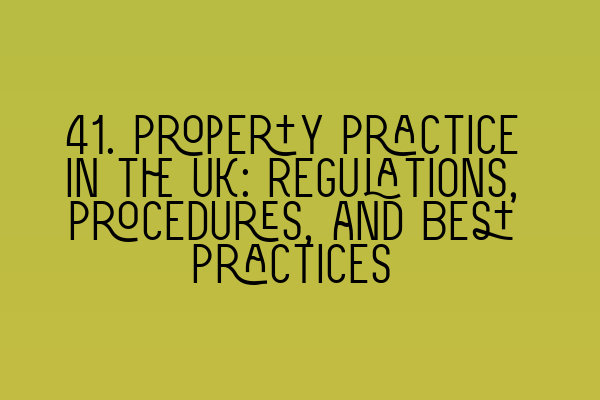Property Practice in the UK: Regulations, Procedures, and Best Practices
Welcome to SQE Property Law & Land Law, your trusted solicitors specializing in property practice in the UK. In this blog post, we will delve into the various regulations, procedures, and best practices that govern the field of property law. Whether you are a first-time buyer, a seasoned investor, or a legal professional looking to expand your knowledge, this post will provide you with valuable insights and information.
Understanding Property Practice
Property practice encompasses a broad range of legal transactions relating to residential and commercial properties. This includes buying, selling, leasing, mortgaging, and transferring properties. As a specialized area of law, property practice is governed by a complex yet essential set of regulations and procedures that ensure fair and lawful transactions.
Regulations and Procedures
In the UK, property practice is regulated by the Solicitors Regulation Authority (SRA) and the Council for Licensed Conveyancers (CLC). These regulatory bodies set out the rules and standards that solicitors and conveyancers must abide by when dealing with property transactions.
When engaging in property practice, it is crucial to adhere to the following regulations and procedures:
- Due Diligence: Before proceeding with any property transaction, it is essential to conduct thorough due diligence. This involves investigating the property’s title, ownership, boundaries, and any potential legal issues or restrictions.
- Contractual Obligations: When buying or selling a property, a legally binding contract must be drafted and executed. This contract outlines the terms and conditions of the transaction, including the purchase price, deposit, completion date, and any additional conditions.
- Searches and Enquiries: Various searches and enquiries should be undertaken to uncover any potential issues that may affect the property’s value or use. These can include searches for planning permissions, environmental concerns, and any restrictions on the property.
- Mortgages and Financing: If purchasing a property with a mortgage, it is crucial to ensure all necessary financing arrangements are in place. This may involve liaising with lenders, drafting mortgage deeds, and ensuring compliance with relevant regulations.
- Completion and Registration: The final stage of a property transaction involves completion, where the ownership is transferred, and the purchase price is paid. Following completion, it is necessary to register the property with the Land Registry to establish legal ownership.
By following these regulations and procedures, you can safeguard your interests and ensure a smooth and legally compliant property transaction.
Best Practices in Property Practice
While the regulations and procedures provide a framework for property practice, there are also several best practices that can enhance your efficiency and professionalism. Here are a few key best practices to consider:
- Communication: Effective communication is vital in property practice. Regularly updating clients, maintaining contact with all parties involved in the transaction, and responding promptly to inquiries can help build trust and ensure a positive experience for all.
- Attention to Detail: Property transactions involve significant amounts of paperwork and documentation. Paying close attention to detail and conducting thorough checks can prevent errors, omissions, and potential legal disputes down the line.
- Continued Professional Development: Property law is constantly evolving, with new regulations and case law shaping the field. Engaging in continued professional development, attending relevant courses, and staying up-to-date with industry changes will enhance your knowledge and expertise.
- Collaboration: Property practice often involves working collaboratively with other professionals, including surveyors, lenders, and other solicitors. Building effective working relationships and fostering collaboration can lead to smoother transactions and better outcomes for clients.
- Ethical Considerations: Upholding high ethical standards is essential in property practice. Acting in the best interests of clients, maintaining client confidentiality, and avoiding conflicts of interest are all fundamental ethical responsibilities.
Further Resources and Exam Preparation
If you are preparing for your SQE exams or looking to enhance your knowledge in property law, SQE Property Law & Land Law offers comprehensive preparation courses. From SQE 1 practice exam questions to SQE 2 preparation courses, we have the resources and expertise to support your learning journey. Additionally, you can refer to our related articles on SQE exam dates and practice mocks to further enhance your exam preparation:
- SQE 1 Practice Exam Questions
- SQE 1 Practice Mocks FLK1 FLK2
- SQE 2 Preparation Courses
- SQE 1 Preparation Courses
- SRA SQE Exam Dates
At SQE Property Law & Land Law, we are committed to providing top-notch legal services and educational resources to help you succeed in your property practice journey. Contact us today to discover how we can assist you with your property law needs.
